- Home
- Michael Wallace
Wandering Star (The Quintana Trilogy Book 1)
Wandering Star (The Quintana Trilogy Book 1) Read online
Table of Contents
Chapter One
Chapter Two
Chapter Three
Chapter Four
Chapter Five
Chapter Six
Chapter Seven
Chapter Eight
Chapter Nine
Chapter Ten
Chapter Eleven
Chapter Twelve
Chapter Thirteen
Chapter Fourteen
Chapter Fifteen
Chapter Sixteen
Chapter Seventeen
Chapter Eighteen
Chapter Nineteen
Chapter Twenty
Chapter Twenty-One
Chapter Twenty-Two
Chapter Twenty-Three
Chapter Twenty-Four
Chapter Twenty-Five
Chapter Twenty-Six
Wandering Star
the Quintana Trilogy Book #1
by Michael Wallace
Copyright ©2018 Michael Wallace
Balsalom Publishing
cover art by Jeff Brown
The Quintana Trilogy
Book 1: Wandering Star
Book 2: The Luminoso
Book 3: Chasm of Fire
Chapter One
Lord Carbón took the lamp from his assistant and illuminated the boy shivering on the ground at their feet. The boy was no older than eleven, and bony ribs showed through rips in his shirt. His trousers barely came past the knees, revealing thin lower legs stained black with soot, and he wore no shoes, though the mine was damp and chill.
But it was the way the boy curled in on himself, hands clenched beneath his belly as if cradling a wound, that drew Carbón’s attention. He instinctively reached for the boy, then checked himself as fear overtook pity. He glanced at his assistant, who was pale with worry, then turned to the foreman.
“How was he discovered? Right here, like this?”
“He touched a witherer,” the foreman said. “I know’d it from the look on his face even before I saw his hand.”
“And then you moved him in here?” Carbón asked.
“No, we didn’t move him. One of the men found him right where you see him. Boy’s a nipper—opens and closes the mine door to let the carts out—and the thing must have come up on him while he was waiting. After it got hold of him, the boy must’ve come back here to die.”
Carbón’s assistant lowered the kerchief from her mouth and said, “If he’s a nipper, and if nobody touched him, then where’s his cap, where’s his oil lamp?”
“Huh,” the foreman said.
The foreman was a short, barrel-chested man named Zayas, with eyebrows like boar bristles. His forearms were thick from lifting and heaving, and his scowl could put a man in his place without a word, though Zayas didn’t have a reputation for being hard or cruel—he only used as much gruffness as necessary. He pulled off his boiled leather helmet and scratched the mat of hair beneath before putting it back into place.
“Guess we never seen the cap nor lamp,” Zayas continued after a moment. “It’s not up by the tracks, neither. Witherer must have taken it out of the mine when it left.”
“Witherers move in shadows,” Carbón’s assistant said. “They have no use for lamps, and no fear of them, either.”
“If the cap had fallen off near the doors, we’d have found it,” Zayas said.
She gave a short nod. “Then it must have fallen off elsewhere. Or something else happened here.”
“You saying it wasn’t a witherer?” the foreman asked her.
Her tone remained neutral. “I’m saying a witherer didn’t make off with the boy’s cap and oil lamp, that’s all.”
Carbón gave his assistant an appreciative nod. Iliana Diamante was an attractive young woman from a prominent family of gem merchants, and when Carbón first met her he’d dismissed her as the type who would flit from party to banquet to ball until she caught the eye of a wealthy man to maintain her expensive tastes. What had been his evidence for that? Maybe none. Maybe simple prejudice.
He’d been surprised to hear that she’d taken his examination, and more surprised when she scored higher than any of the other seventy-three applicants. Skeptical, he’d tested her in person, throwing sums at her and telling her to add them in her head. Five minutes of conversation disabused him of lingering doubts. That had been six months ago—she was coming along nicely in his service.
Iliana now stood staring at the boy, the handkerchief lowered slightly in her left hand, while her right index finger pressed at her nose, turning it up slightly at the tip. Carbón had learned to recognize that expression as doubt and caution.
Still holding the lamp, Carbón stepped around the boy to examine the room, which seemed to be a repository for worn pickaxes and shovels, their handles cracked and their ends dulled. A mine cart with a broken axle sat overturned on one side, also awaiting repair, but covered with other, smaller tools, as if it were serving as a temporary workbench in the meantime.
The chamber itself smelled of coal dust and rot. Carbón had been prepared for the first of these smells, a slight tang, almost spicy, that coated the throat and lingered on the edges of the tongue after every breath. That smell had greeted him when a nipper—this boy’s replacement—threw open the mine doors and let them in.
That odor—no, taste—had once been a constant companion in Carbón’s life, and while he almost never returned to the mines, though he owned them now, when he did encounter coal dust, the memory of its scent and taste was like a hand on his shoulder, black and claw-like, to drag him into the cellar of his past.
But what about the rot? The rot was an incongruous note. It was akin to the stench of offal one encountered in the lower terraces of the city, or a poisoned rat that had crawled into the wall to die. Not a smell that belonged here, in a shaft penetrating coal deposits either laid down millions of years ago or left by the Elders—depending on whether you listened to the natural philosophers or to the cabalists of the Luminoso.
He returned the lamp to Iliana and told her to hold it out so he could see, determined to have a closer look at the nipper. The boy’s seizure-like trembling grew worse, and Carbón unclasped his cloak as he knelt.
“I . . . um, wouldn’t get so close to the lad if I were you,” the foreman said nervously. “Your Grace?”
“Lord Carbón?” Iliana said.
“Nonsense, it’s not contagious.” Truth was, he was nervous, and spoke as much to reassure himself as anything. “Anyway, the poor child is suffering—something has to be done.”
Carbón wrapped his cloak around the boy’s shoulders. He was casting off so much heat it was like standing next to one of Lord de Armas’s forges. Yet the boy drew the cloak around himself with a groan as if freezing.
“Can you hear me?” Carbón asked.
A nod. The eyes remained closed, fluttering behind coal-dust-grimed eyelids.
“What is your name?”
Thin, quavering: “Santi.”
“Do you have a family name, Santi?”
The boy shook his head. No surprise there; many of the poorest families in the dumbre didn’t.
“Let me see your hand.”
Another shake of the head. But Carbón wasn’t asking permission. He took the boy’s arms and tried to pull them out to take a closer look. Santi twisted away with a moan, tucked his bad hand up farther beneath his body, and tried to turtle down on it.
Zayas, apparently getting over his unease as he saw his master in the dirt, grabbed the boy by the back of the neck with one hand and pried away the boy’s good arm with the other. Santi cried out.
“Gently,” Carbón told Zayas.
/>
He took Santi by the forearm and felt a burning, tingling sensation as his fingers brushed the boy’s hand. He recoiled as if stung, and the boy almost broke free before Carbón got hold of his fears. He pulled the boy’s arm away from his body.
The lamp wavered in Iliana’s hand, jiggling nervously like she was drunk or caught in a temblor, but she gamely stepped forward to illuminate Santi’s right hand as Carbón held it up to the light.
The middle three fingers had curled into blackened claws, and the tips of the thumb and little finger were black as well. The nails hung from their beds like old shingles on a rotting roof. Streaks of black crept across the palm like seams of coal running through pale sandstone.
Iliana drew in her breath. “By the Elders, it was a witherer. How did it happen? Where was he? You don’t think there are . . . Did whatever cause this get out? You don’t think the cabalists know, do you? If Salvatore hears, if there are other cabalists in the—”
“Hush,” Carbón said. “Let me think.”
The boy was trembling in his grasp, so hot—how could anyone survive such a fever?—and his flesh seemed hottest near the blackened hand. A few touches confirmed—the boy was somewhat cooler in the lower limbs. It was radiating out from the wound, then.
“Did this happen to you by the door? Did you see something coming by?”
The boy shook his head.
“Santi, tell me. Where did it happen?”
“I went down. Down to the cut.” He swallowed hard. “Left my . . . my post. Only a minute. Please, water.”
Zayas grumbled. “Might have been between shifts. Maybe we was pumping. The new cut lets up a lot of water. Shouldn’t have been down there, though. Blasted kid—it serves him right.”
“You were down in the new cut?” Carbón pressed.
The boy nodded. “Yes, Your Grace. Please, I am so thirsty.”
Carbón turned to his assistant. “Set the lamp right there. Run back to the barrel by the door and get a ladle of water.”
“It’s dark. How will I see if I leave the lamp?”
“You’ll find your way,” he told her. “Call out for the rail supervisor when you get out. He’ll turn up the lamps when he hears your voice.”
As if in response to his order, the sound of metal squealing against metal sounded outside the room, together with snorting donkeys and grunting mine workers. It was a coal-laden cart coming up from the seam. They’d have a light, if Iliana hurried.
“I don’t understand,” Zayas said when she was gone. “Is it a withering or not?”
Santi’s eyes flickered open, reflecting lamplight. Carbón looked away from the boy and met the foreman’s gaze.
“Yes, I’m afraid so.”
Zayas’s tone softened. “Poor little nipper. We shouldn’t let him suffer. And especially not down here. You know how them workers are, even the boys. Don’t like nothing to do with the shadowy stuff. I’ll find a couple of my men, them with a strong stomach, and we’ll get him outside, let him see the sun one last time.”
“Don’t let me die. Please . . . my mama.”
“Nothing to be done for that now, boy.” Something husky entered the foreman’s voice. He was a hard man, Carbón thought, but not a cruel one.
Iliana pushed the door open as she reentered, which brought in a whoosh of chill air that didn’t smell so foul. She held the ladle to the boy’s lips, and he drank greedily. He didn’t make it all the way through before he’d curled back on himself with another violent bout of shivering. This time Carbón let him back down. But he needed more information before he could leave.
“So you went down to the new cut?” he pressed. The boy nodded. “Whatever for? Why would you leave your post?”
“Answer up, boy,” the foreman said. “You left your post—that’s a beating, and you knew it. Two brass pennies off your wage, too. Why would you go down there?”
Santi turned his head and said in a miserable tone, “I needed a piece of chalk.”
Carbón didn’t understand. “Chalk?”
“The mine engineer uses it to mark cuts in the seam,” the foreman said. “Got to leave enough support columns so you don’t get a collapse.”
“I know what it’s used for.”
“Sorry, Your Grace.”
Carbón had never worked in the mines, either as a nipper or as a digger. But lumps of coal had sometimes come through the breaker marked with white lines, symbols, or letters—notes from the engineer to the foreman. Eventually, wood posts would go up, and the coal pillars themselves came out, and the marked pieces rolled across on the belt.
“But why would you need chalk?” Carbón asked. The boy only shook his head as another violent shiver overcame him.
“Maybe he was stealing it to sell in the lower terraces,” Iliana said.
“Could be,” Zayas said, but he sounded doubtful. “This one wasn’t much trouble, but I guess it might be so. God knows we lose enough around here to the little thieves. Like rats in the larder sometimes.”
The theft problem couldn’t be that bad, Carbón thought, or they wouldn’t have left all the worn tools unguarded in this room. Then again, it wouldn’t be all that easy to walk past the foreman carrying a broken shovel, or even the head of a pickax. A paper-wrapped parcel of chalk could be stuffed down one’s pants.
“Was it to sell?” he asked Santi. “Tell me—you won’t be punished.”
But the boy was too far gone in his shivering, and was sweating out all the water Iliana had given him moments earlier, which soaked into Carbón’s already coal-stained cloak. The lining and collar were imported silk from one of Lady Mercado’s most expensive shipments—it would need to be sent down to a specialist for cleaning.
And then he remembered what needed to be done to the boy, to the mine itself, and dismissed worries about his cloak as unworthy, even shameful.
“The nipper may be a thief,” Zayas announced, “but that bit of stolen chalk is going to cost him his life. Don’t seem right somehow.”
Carbón rose to his feet. “I’ve seen and heard enough. I know what needs to be done. Follow me outside, the two of you.”
Iliana led the way with the lamp. They came into the main shaft as another carload of rock coal heaved up from the depths, rising slowly, laboriously on grinding wheels while two donkeys strained and coal-stained men with sinewy muscles leaned into it to get it up the slope. Eyes turned toward Carbón, Iliana, and the foreman, and one man whispered something to another, but nobody slacked as they muscled the cart forward. The distant hum of a water pump mingled with the clank and clink of shovel and pick echoing from the depths.
“Quickly, now,” Carbón said when Iliana seemed to hesitate instead of moving around the cart. “Get us out of here.”
They got to the door, where a nipper even younger than the one they’d left behind stood, cap askew, a little flame burning in the oil lamp on his head. He was standing there, waiting for the cart, but the foreman’s growls set him in motion. He leaned his thin back into the doors, and they swung open on creaky hinges. The sun outside made gritty columns of light in the gloom. Carbón pushed past, eager to be outside. To feel the sun and breathe the clean air blowing across the Quintana Plateau.
Iliana grasped Carbón’s arm at the last moment. “Look!”
He turned to the doors, which still hung open. There, on the inside, were drawings of birds and flowers and fish, all sketched in delicate lines of white chalk.
“Well now,” Zayas said. He removed his boiled leather helmet again and scratched at his scalp. “All those times through, and I never once noticed it.”
That solved one mystery, anyway. If the breaker work was urgent, loud, and terrifying, the silence and boredom of the nipper’s life must be worse.
So what had Santi done? He had stolen a bit of chalk to draw with, and thereby to relieve the lonely ache that must have consumed his heart during the endless watches alone in the darkness, with only the flickering glow of the oil lamp on his cap t
o see by. And in so doing, he had touched a witherer, and would lose his life for it.
Chapter Two
Once outside, Carbón stood for several seconds, blinking in the intense sunlight, filling his lungs with air that carried the humidity of the marshes in the highlands to the west and the smell of the river as it churned through the cascades. The tang of coal still hung in the air, thanks to the two-story piles of black rock heaped around the mine, as did the smell of combustion from the steam engine huffing into the station to carry it away, but it was diminished, somehow, and tolerable.
To the right stood the hulking, hateful breaker, and with it, the sound of rushing water, as the captured current rushed through the millrace to drive the wheel that turned the crank that kept the belt running at a constant pace. Inside that building squatted dozens of thin, coughing boys not so different from the injured nipper. There the boys plucked out rocks and culm from the river of coal, fingers wrapped in rags to keep their skin from peeling off, while foremen shouted at them and struck them on the shoulders with a stick when they doubled over with exhaustion.
They’re from the dumbre. They’ll starve without the coins you pay them. Their families will starve. You would have starved too, without the pay of the mines.
Maybe so, but it was still a mean, ugly life, and standing so close to the hated breaker building made him ache with the weight of memory.
A steam engine could have moved the belt hauling the coal through the breaker, but here by the upper cascades of the river that eventually poured into the Rift, there was too much water power to ignore. But that water also supplied the city, and so there were strict rules about how much of the current could be removed, and what must be done with the water when it finished its task. Eventually, he might have to install a steam engine to supplement, but no need to rush that day.
All the more coal to sell, to enrich yourself with. Isn’t that right?
A trio of guards with muskets patrolled the rails leading out of the yards, but the men had a lazy swagger about them, not the crisp movements you saw from de Armas’s soldiers beyond the Great Span. Here on the protected side of the city, the biggest risk was organized bands of coal thieves, and these could be put to flight easily enough.

 Crowlord (The Sword Saint Series Book 2)
Crowlord (The Sword Saint Series Book 2) Crowlord
Crowlord The Red Sword- The Complete Trilogy
The Red Sword- The Complete Trilogy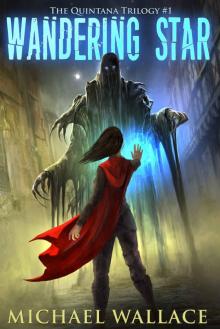 Wandering Star (The Quintana Trilogy Book 1)
Wandering Star (The Quintana Trilogy Book 1)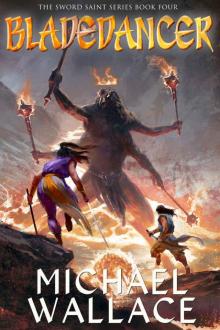 Bladedancer
Bladedancer Sword Saint
Sword Saint The Alliance Trilogy
The Alliance Trilogy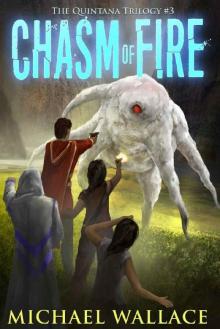 Chasm of Fire
Chasm of Fire Bladedancer (The Sword Saint Series Book 4)
Bladedancer (The Sword Saint Series Book 4) The Devil's Deep
The Devil's Deep Shadow Walker (The Sword Saint Series Book 3)
Shadow Walker (The Sword Saint Series Book 3) Starship Blackbeard
Starship Blackbeard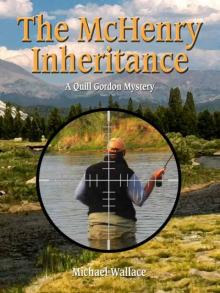 The McHenry Inheritance (Quill Gordon Mystery Book 1)
The McHenry Inheritance (Quill Gordon Mystery Book 1) Sun King (The Void Queen Trilogy Book 3)
Sun King (The Void Queen Trilogy Book 3) Blood of Vipers
Blood of Vipers Righteous - 01 - The Righteous
Righteous - 01 - The Righteous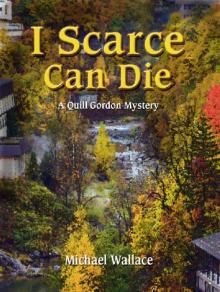 I Scarce Can Die (Quill Gordon Mystery Book 5)
I Scarce Can Die (Quill Gordon Mystery Book 5) The Devil's Cauldron
The Devil's Cauldron The Wicked (The Righteous)
The Wicked (The Righteous) Crow Hollow
Crow Hollow Righteous03 - The Wicked
Righteous03 - The Wicked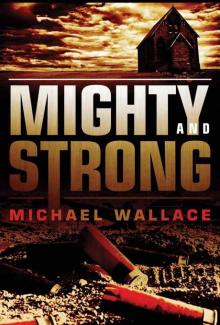 Righteous02 - Mighty and Strong
Righteous02 - Mighty and Strong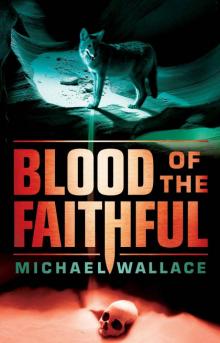 Blood of the Faithful
Blood of the Faithful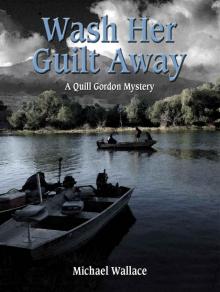 Wash Her Guilt Away (Quill Gordon Mystery Book 2)
Wash Her Guilt Away (Quill Gordon Mystery Book 2) The Kingdom of the Bears
The Kingdom of the Bears The Emerald Crown (The Red Sword Trilogy Book 3)
The Emerald Crown (The Red Sword Trilogy Book 3) The Dark Citadel
The Dark Citadel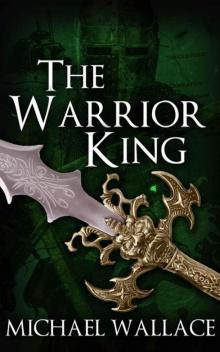 The Warrior King (Book 4)
The Warrior King (Book 4) Rebellion of Stars (Starship Blackbeard Book 4)
Rebellion of Stars (Starship Blackbeard Book 4)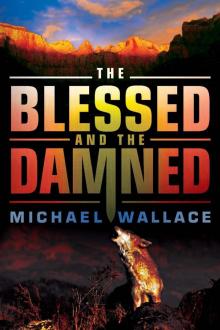 Righteous04 - The Blessed and the Damned
Righteous04 - The Blessed and the Damned The Crescent Spy
The Crescent Spy Queen of the Void (The Void Queen Trilogy Book 1)
Queen of the Void (The Void Queen Trilogy Book 1)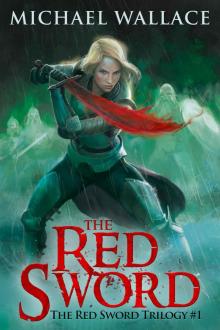 The Red Sword (The Red Sword Trilogy Book 1)
The Red Sword (The Red Sword Trilogy Book 1) The Sentinel (The Sentinel Trilogy Book 1)
The Sentinel (The Sentinel Trilogy Book 1) The Golden Griffin (Book 3)
The Golden Griffin (Book 3)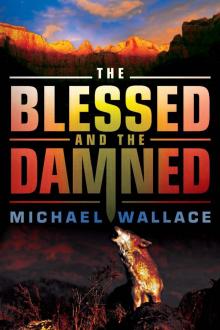 The Blessed and the Damned (Righteous Series #4)
The Blessed and the Damned (Righteous Series #4)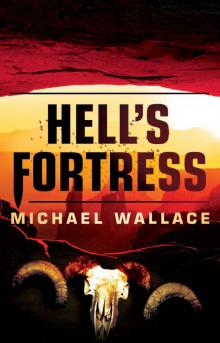 Hell's Fortress
Hell's Fortress Not Death, But Love (Quill Gordon Mystery Book 3)
Not Death, But Love (Quill Gordon Mystery Book 3) Destroying Angel
Destroying Angel The Free Kingdoms (Book 2)
The Free Kingdoms (Book 2) Dragon Quadrant (The Sentinel Trilogy Book 2)
Dragon Quadrant (The Sentinel Trilogy Book 2) Shattered Sun (The Sentinel Trilogy Book 3)
Shattered Sun (The Sentinel Trilogy Book 3) The Wolves of Paris
The Wolves of Paris Lords of Space (Starship Blackbeard Book 2)
Lords of Space (Starship Blackbeard Book 2) Dreadnought (Starship Blackbeard Book 3)
Dreadnought (Starship Blackbeard Book 3) The Village of Dead Souls: A Zombie Novel
The Village of Dead Souls: A Zombie Novel The Black Shield (The Red Sword Book 2)
The Black Shield (The Red Sword Book 2) The Daughters Of Alta Mira (Quill Gordon Mystery Book 4)
The Daughters Of Alta Mira (Quill Gordon Mystery Book 4) Mighty and Strong (The Righteous)
Mighty and Strong (The Righteous)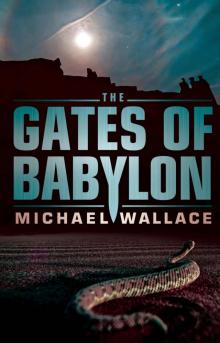 The Gates of Babylon
The Gates of Babylon